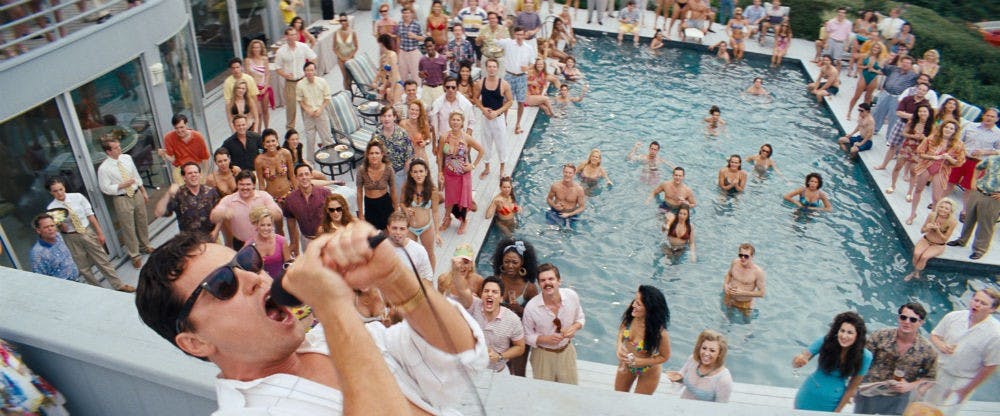Martin Scorsese’s “The Wolf of Wall Street” is loutish, angry, hilarious, slightly cathartic, and utterly fascinating while blowing through three hours of conspicuous consumption. Trudging along with such a whirlwind force that “The Wolf of Wall Street” as a cinematic experience can become a devastating tornado of debauchery and chicanery.
Jordan Belfort (Leonardo DiCaprio, “The Great Gatsby”) is ambitious, young and filled with a hunger for sitting among Wall Street’s highest echelons. At the opening he does, rattling off his catalog of McMansions, yachts, trophy wives, luxury automobiles as well as his taste for high class drugs, decadence and women.
The film then shifts to the rise of Belfort’s bullshit con-game, when he starts as a phone operator for the brokerage of L.F. Rothschild. Here he meets Mark Hanna (Mathew McConaughey, “Dallas Buyer’s Club” in an electric few minutes) and receives some chest beating, courage boosting guidance over cocktails and cocaine. Belfort, with newfound inspiration, passes his Series 7 and begins his work on the day the market collapses and forces L.F. Rothschild’s entire operation to close up.
Retreating to the suburbs and in need of work, Belfort eventually gets into a small brokerage firm of seedy value selling penny stocks. Belfort proves to be so proficient in “selling garbage to garbagemen” with these questionable stocks, involving companies of minimal value, that he recruits a group of vulgar and inept barbarians to start his own brokerage firm of Stratton Oakmont.
Soon, Belfort’s operation goes from a small time group of nobodies in a auto repair garage to a high scale operation where Forbes eventually runs a profile crowning him “The Wolf of Wall Street.”
Selling is the business that Dicaprio’s Belfort exceeds in and what remains constant throughout the entirety of “The Wolf of Wall Street” is the banality of selling, even at the expense of dignity when selling reinforces power in excess. “The Wolf of Wall Street’s” main trade is in DiCaprio’s increasingly absurd contortionist performance; turning him into a corrupted Jay Gatsby of the 21st century.
Donie Azoff (Jonah Hill, “Moneyball”) becomes Belfort’s most trusted partner in the twisted, tweaked-up efforts in his pump-and-dump outfit. Hill plays a one note throughout as a bleached toothed aspiring WASP, but Hill’s skill is in playing that note with a smooth virtuosity.
“The Wolf of Wall Street” has qualities which allude to Henry Hill’s soul bearing in “Goodfellas,” Scorsese pulls some similar cinematic artistry here. He buries the camera into braying stock brokers as Belfort throws heated and bellowing rhetoric into the crowd, essentially feeding the animals raw meat and having the camera watch them tear the office apart.
Belfort’s exploits eventually turns in on itself leading to the collapse of his entire empire of degeneracy. The film turns the question back to the audience as Belfort, both the real and the fictional characters who have become motivational speakers, lecturers hundreds of itinerant subjects hoping the glean some bits of wisdom from a character as empty as Belfort.
Everyone wants a piece of the “American Dream,” even if it involves selling the soul to do so, but what rests atop selling those will-o’-the-wisp dreams and invoking trickery lies some sort of banal wisdom. Belfort, whether he is a credit of the institution he came from (hint: it’s American University) or if he is truly a self-made product, his legacy lasts upon others taking his exploits at face value.
Scorsese seems to at least suggest at something deeper. Amid the degeneracy is something anthropological. An answer to why greed, in “Wall Street” Gordon Gekko’s words, is not just good, but profitable and mangling to the soul. By the last frame it becomes clear that a film as classically-composed as “The Wolf of Wall Street” there seems to be nihilistic and cynical conclusion after so much brilliant comedy. If that is so, then the whirlwind will keep on spinning higher and pie-in-the-sky dreams will remain out of reach.





